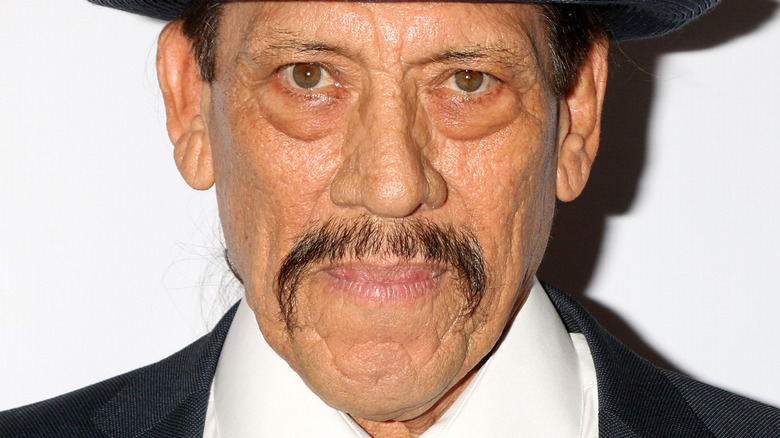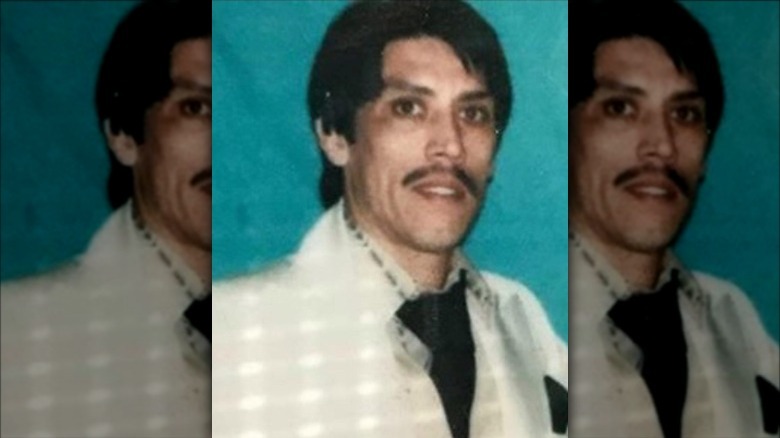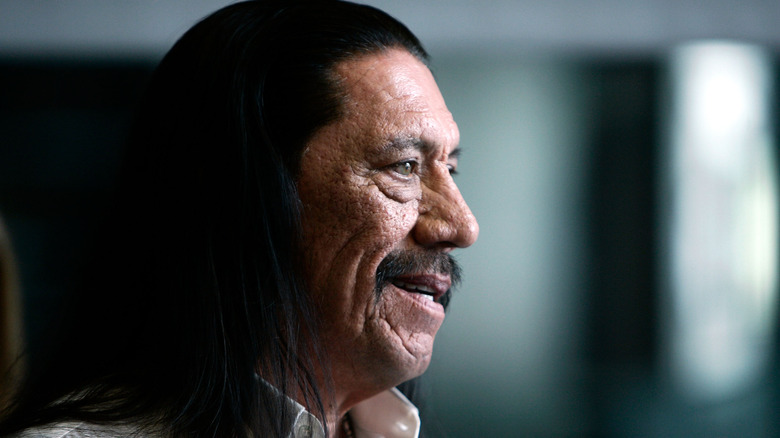What Danny Trejo's Life In Prison Was Really Like
Danny Trejo has become synonymous with Hollywood's tough guy. For Trejo's portrayal of Machete and performances in "Desperado" and "From Dusk till Dawn," his stern face made him an icon within the genre. And Trejo has no issues with it. In an interview on NPR's "Fresh Air," Trejo opened up about being asked whether he minded playing into the stereotype. "I said, 'I am the mean Chicano dude with tattoos.' So it was like, somebody finally got it right," he said.
He wasn't exaggerating. Trejo served time for myriad offenses, some of them quite serious. The actor's first encounter with authorities happened when he was just 10 years old on accusation of assault and battery, HuffPost reported. He then upgraded to robbing using live grenades and it continued to escalate from there to drug dealing. "The last time I went to the joint it was for selling four ounces of pure sugar to a federal agent," he told Prison Legal News.
Trejo's run-ins with the law may sound extreme but that's all he knew growing up. After suffering abuse at the hands of his father, Trejo's uncle — who was only six years older — stepped in as the main male figure in his life. "My uncle turned me on to grass when I was eight years old," he detailed. He was soon joining him in committing robberies and other crimes. As a result, Trejo spent many of his formative years in the system — and learned quite a few lessons along the way.
Danny Trejo was first arrested as a teenager
Danny Trejo has a long, complicated relationship with the criminal justice system. He was first incarcerated in 1959, when he was around 15, he told Prison Legal News in 2011. At 18, Trejo experienced his first stint in a non-juvenile prison. Three years later, he was jailed again. In just a few years, Trejo had been at six correctional facilities, including San Quentin and Folsom state prisons.
Behind bars, Trejo finished high school after learning a diploma might come in handy. "When I got into the joint my homies said, 'Hey Danny you gotta get into dry cleaning, it's the best job in the joint' ... So I put in a ducket for the dry cleaning and I got it back: 'This trade requires a high school diploma,'" he said. Between studying and working, Trejo also found time to get into quite a bit of trouble. Just two years before the infamous '70 riot at Soledad State Prison, Trejo himself participated in one, according to Texas Monthly.
Because he threw a rock at a guard, he was placed in solitary confinement. "You can become a bit of a sociopath [in prison], and I think I just stopped caring," he said. As an inmate in California, he crossed paths with some notorious figures, including Charles Manson. He was unimpressed. "[He was a] greasy, dirty, scrawny white boy," Trejo wrote in his memoir, "Trejo: My Life Of Crime, Redemption, And Hollywood" (via AV Club).
Danny Trejo believes in rehabilitation for ex-convicts
Danny Trejo's experience behind bars helped shape his life in different ways, even playing a part in his success as an actor. But he knows he was among the lucky few. "I could still be in prison. Hell, for all I did, I could be headed to the gas chamber," he wrote on Twitter in 2013, referring to San Quentin's execution chamber. "This is all icing."
While he believes he should be held accountable for his past actions, he doesn't believe it should define who he is or his future. "A lot of people in prison have redeemable qualities, if we can help them they can and will become productive citizens," he tweeted in 2021. "If I can make it, you can make it." After his last stint in his mid-20s, Trejo often returned to speak with inmates. He also became a voice for ex-convicts' rights. "I honestly believe that if you come out of prison, you need a support group and not a parole officer," he said on "Fresh Air" in 2020.
Among those is the right to vote, for which he criticized former President Donald Trump. "I think anybody out of prison should be able to vote — whether on parole or probation," he told TMZ. Trejo also argued the right should be extended to those who've yet to be found guilty. "If you're in the county jail, that's before you've gone to prison ... you should be able to vote."



